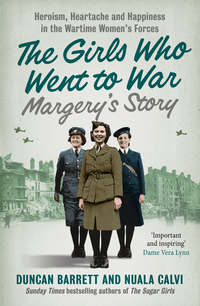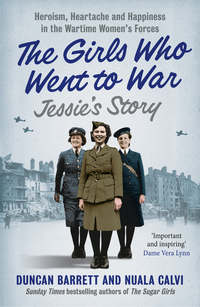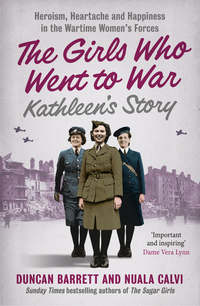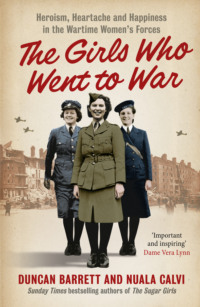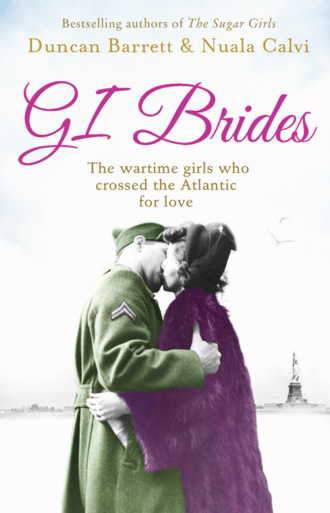
Полная версия
GI Brides: The wartime girls who crossed the Atlantic for love


In memory of Mary McIntosh
Contents
Cover
Title Page
Dedication
Chapter 1: Sylvia
Chapter 2: Rae
Chapter 3: Margaret
Chapter 4: Gwendolyn
Chapter 5: Sylvia
Chapter 6: Rae
Chapter 7: Margaret
Chapter 8: Gwendolyn
Chapter 9: Sylvia
Chapter 10: Margaret
Chapter 11: Rae
Chapter 12: Sylvia
Chapter 13: Gwendolyn
Chapter 14: Margaret
Chapter 15: Sylvia
Chapter 16: Gwendolyn
Chapter 17: Rae
Chapter 18: Sylvia
Chapter 19: Margaret
Chapter 20: Gwendolyn
Chapter 21: Sylvia
Chapter 22: Rae
Chapter 23: Margaret
Chapter 24: Gwendolyn
Chapter 25: Sylvia
Chapter 26: Rae
Chapter 27: Margaret
Chapter 28: Gwendolyn
Chapter 29: Sylvia
Chapter 30: Rae
Chapter 31: Gwendolyn
Epilogue
Acknowledgements
June’s Story
The Sugar Girls
What next?
Copyright
About the Publisher
1
Sylvia
As the 8.10 to Charing Cross pulled out of Woolwich, Sylvia Bradley could barely contain her excitement. At fifteen and a half, she had only just left school, and was thrilled to be joining the crowds of glamorous women who took the train ‘Up West’ every morning to work in the capital’s grand hotels and shops. Her blonde hair had been perfectly curled for the occasion, and her brand-new lipstick applied.
If Sylvia’s mother had got her way, she wouldn’t have been there at all. A talented seamstress, Mrs Bradley had been a furrier before the war, working from home sewing the false eyes and noses on fox furs for a West End shop. Applying the wartime philosophy of make-do-and-mend, these days she prided herself on keeping her family well turned out, despite clothes rationing, by finding old garments in second-hand shops and working miracles on them so that they looked brand new. She had easily found her eldest daughter a position with a local tailor in East London, sewing trouser hems.
But Sylvia, who had grown up surrounded by the fox furs that her mother took in and hearing about the fashionable shops where they were sold, dreamed of one day working in the West End. She couldn’t help admiring Dolly Stickens, who lived on the next road over, and who her mother sometimes did sewing work for. Dolly worked in the Piccadilly Hotel, and every day she set off for town looking incredibly smart, her face well made-up.
‘Look at her, at her age, wearing all that make-up!’ Sylvia’s mother tutted. Mrs Bradley would never have rouged her face, let alone dyed her hair a shocking red like Dolly’s.
But to Sylvia, the other woman looked like a movie star.
Dolly’s job was selling theatre tickets from a little kiosk at the Piccadilly, and one day she heard that the hotel was looking for a couple of young women for the billing office. ‘Perhaps your Sylvie might be interested,’ she said.
‘Oh, no, she wouldn’t want to work so far away,’ Mrs Bradley said dismissively.
Sylvia saw her chance drifting away and quickly piped up. ‘I wouldn’t mind. I think I’d like it.’
‘Well, I’ll put in a word for you then,’ said Dolly with a smile. ‘Ta-ra!’ She was gone before Mrs Bradley had a chance to protest.
Sylvia was ecstatic when, a few days later, Dolly gave her the news that she was to be given a trial period as a comptometer operator. She had no idea what that meant, but she didn’t care. All she knew was that she would be joining the stylish women who headed into town every morning.
When she arrived at Charing Cross, Sylvia was almost knocked over in the fray as everyone bustled off the train and hurried to the exit. She had only been into central London once before, when she was a child and her father had taken her to Madame Tussauds. Although she was older now, she was still struck by how big everything was, and how busy it felt compared to Woolwich.
Dolly had given Sylvia written instructions for getting the bus up to Piccadilly, which she followed carefully, finally alighting outside the hotel’s grand Palladian façade. The billing office was up a little spiral staircase at the side, and when she arrived a rather intimidating manageress called Miss Frank showed her how to clock in with a card. Then she sat Sylvia down in the office and explained how to use the comptometer – which turned out to be an adding machine for processing the hotel’s bills.
Sylvia did her best to listen, but her attention was caught by a large half-moon window that overlooked the street. Below, Mayfair thronged with exotic-looking men, from Free French and Polish soldiers to various foreign dignitaries.
‘Here comes our maharaja!’ one girl shouted, and all the others ran to the window, as a handsome Sikh in a bright-blue turban walked past.
‘Comes past the same time every day,’ said a girl called Peggy, who sat at the desk next to Sylvia’s. ‘I reckon he’s got a princess hidden away in one of the hotels who he goes to visit secretly.’
‘Back to work, girls,’ Miss Frank said, and they all returned to their machines.
Over the course of the day, Sylvia learned that the people-watching was considered the best part of the job at the Piccadilly, and took up much of the girls’ time. And increasingly, it was Americans who were the main players in the movie unfolding outside their window, as the whole area was taken over by the soldiers of the ‘friendly invasion’.
The first GIs had come to the British Isles in January 1942, less than two months after the bombing of Pearl Harbor, and by the summer there were tens of thousands of them arriving every month. Mayfair had become known as ‘Little America’, since the US Embassy and US Army headquarters were on Grosvenor Square, and its grand Georgian houses had been turned into accommodation and offices for US admin staff. An Englishman on the streets of Mayfair now looked like the odd one out.
Directly opposite the Piccadilly Hotel was the USO Club, and Sylvia and her colleagues could see the GIs swaggering in and out in their smart uniforms. They were quite unlike the Tommies of the British Army in their heavy serge – the better cut and higher-quality material of the Yanks’ outfits made it hard to tell an officer from a private. The stripes on their sleeves, which were upside down from the British perspective, only confused matters further. Then there was the way they moved – often seen slouching with their hands in their pockets, or leaning against a wall chewing gum, they lacked the straight-backed gait of British military discipline. Their relaxed marching style, carried out in rubber-soled boots, had even earned the nickname ‘the soft-shoe shuffle’.
Their approach to women also seemed confident and direct by local standards. From her window at the hotel, Sylvia watched countless young American servicemen chatting up attractive young women in the street, sometimes employing the ‘reverse handkerchief trick’ where they dropped a coin in the woman’s path so that she would pick it up and begin a conversation.
Despite the apparent confidence of the GIs she watched, however, Sylvia couldn’t help feeling sorry for them. ‘I reckon they must be lonely,’ she told Peggy. ‘They’re so far away from home.’
‘Not lonely for long, I’ll bet,’ her colleague laughed, gesturing towards a GI who had just hooked a young English girl onto his arm.
Sylvia gravitated towards Peggy, thanks to her cheeky sense of humour, and much of the rest of their day was spent in fits of giggles, which they tried to suppress whenever Miss Frank was within earshot. By clocking-out time, Sylvia left the Piccadilly Hotel happy that she had made a new friend, and looking forward to her next day working ‘Up West’.
A few days later, Peggy came into the billing office buzzing with excitement. ‘Guess what, Sylvia?’ she said. ‘The American Red Cross are looking for girls to volunteer at their clubs. We could go and sign up after work.’
The Red Cross had set up numerous clubs in central London to cater for the GIs based there, as well as the thousands who would pour in from all over the country when their two days a month’s leave came up. On Piccadilly Circus was the famous Rainbow Corner club, open twenty-four hours a day, where the GIs could shoot pool, play pinball, eat hamburgers and waffles, and generally get a taste of ‘home’.
‘I will if you will,’ Sylvia replied enthusiastically. She was delighted at the thought of doing something to help the Americans, and Peggy seemed quite keen on the idea too, if the grin on her face was anything to go by.
After work that day, the two girls took themselves to the US Embassy for an interview. A Red Cross lady in a military-style blue uniform took down their names and addresses, and asked what their parents did for a living. I hope they don’t only want posh girls, Sylvia thought to herself, as she explained that her dad worked at Greenwich Gas Works and her mum made shell casings at Woolwich Arsenal.
But the American woman didn’t seem to be put off by anything that Sylvia said. ‘The most important thing is being warm and friendly,’ she told her. ‘Whatever problems you have in your own life, you check them at the door. Our boys deserve a good welcome the moment they step inside a Red Cross club.’
She explained that Sylvia and Peggy would be sent to the Washington Club on nearby Curzon Street, and would be expected to work there two nights per week. Sylvia’s first three-hour shift would be the following Tuesday, while Peggy would start later in the week.
When she arrived on Curzon Street after work on Tuesday, Sylvia found the club easily. It was housed in the Washington Hotel, which had suffered bomb damage during the Blitz but had recently reopened, and as she passed under a big blue awning and through the revolving front door, she felt a thrill of excitement go through her.
Inside, she was met by a young woman in Red Cross uniform. ‘You must be the new volunteer,’ she said. ‘Follow me.’
Sylvia was aware of music playing in the distance, as the young woman led her down a corridor leading further into the hotel. On either side of them were racks of American newspapers and magazines from various states, with pride of place given to the Stars and Stripes, the servicemen’s newspaper, written by American journalists in London and distributed by the News of the World. As they passed into a large room at the end of the corridor, the music got louder, and Sylvia could make out the final bars of ‘I’ll Be Seeing You’ giving way to the lively beat of Glen Miller’s ‘In the Mood’.
The room was filled with GIs – some playing pool, some jostling for control of the jukebox, and others taking doughnuts from a silver machine in the corner – while half a dozen young women rushed around serving them. A smell of apple pie suffused the air, and Sylvia could hear snatches of conversation in a variety of distinctive American accents, from the rapid, nasal speech of New York to the lazy drawl of Alabama. It really did feel like being in another country, she thought.
The kitchen was a small affair at the back of the room, and inside Sylvia could see volunteers peeling potatoes and washing dishes. ‘So, what can I do?’ she asked, keen to get stuck in.
‘You can start by clearing the plates off the tables,’ the other girl told her.
Sylvia didn’t need asking twice. She put away her coat and bag and got to work straight away.
Clearing the GI’s tables, Sylvia found she learned a lot about American eating habits. For a start there were the strange combinations of sweet and savoury items on a single plate, such as bacon and eggs topped with strawberry jam. Then there were the soft drinks that went along with them. Many of the GIs were sipping a dark substance that looked like some kind of fizzy vinegar, and Sylvia learned it was called Coca-Cola.
But the most striking thing about the GIs’ meals was the sheer size of them – a single plateful might constitute half a week’s rations in England, and they often left much of their food uneaten. Sylvia felt guilty as she threw away plates full of perfectly good food, aware of how much her mum struggled at home to feed the family.
The GIs were keen to chat to her as she worked. ‘Hey, beautiful, don’t forget my plate!’ one called out. ‘Aw, honey, why don’t you come sit down with me?’ shouted another.
At first Sylvia blushed shyly at their remarks, but after a while she got used to laughing them off like the other girls did. She remembered what she had been told about giving the men a warm welcome, and when they wanted to talk to her about their homeland she was a willing listener. One young man told her about living in North Dakota, where it snowed for six months of the year. Another described growing up in sophisticated San Francisco, while a third, from Arizona, told her all about life on the border with Mexico.
Sylvia loved to hear their tales of America, and she could see it helped them too. Beneath the bravado and charm, they were lonely young men in a strange country, far from their families and facing an uncertain future. They knew they hadn’t been sent to England just to have a good time – one way or another they were preparing for an invasion of the Continent, which they described rather poetically as ‘the far shore’. Sylvia knew there would be dark days ahead for many of the men in the room, but in the meantime, the least she could do was keep their spirits up.
As she worked, she began humming along to the music issuing from the jukebox. Her dad had always described American music as ‘twaddle’ when it came on the wireless, but Sylvia loved the swing sound of Glenn Miller and his ‘Chattanooga Choo Choo’, and soon she was singing her heart out.
With Sylvia volunteering at the Washington Club, her mother became worried that she would be pursued by GIs. Like many parents, she was distrustful of the Americans, who had quickly gained a reputation for being ‘overpaid, oversexed and over here’. She knew her petite blonde daughter, with her big blue eyes and hourglass figure, would be sure to attract their attention.
Mrs Bradley was extremely protective of Sylvia, and had already had to fend off the advances of several local boys. When she was fourteen, a boy Sylvia had known since childhood had suddenly come to see her in a new light. Arthur was eighteen and already a pathfinder in the RAF, and his parents were friends of the Bradleys. When both families were in The Castle pub one night, he asked if he could walk Sylvia home. ‘All right, but you better behave yourself,’ her mother replied.
When they reached the doorstep, however, Sylvia’s beau went in for more than a peck on the cheek. They were necking away, when she suddenly felt Arthur’s hand wandering over her breast and pulled away in shock.
‘You might be a pathfinder in the Air Force, but you ain’t making no paths over me!’ she said, rushing into the house and slamming the door.
Mr and Mrs Bradley returned from the pub a few minutes later. ‘Mum, that Arthur just tried to touch me on the chest,’ Sylvia said.
‘Oh, he did, did he?’ Mrs Bradley replied, her eyes flashing. She took an umbrella and went straight out onto the street. Arthur was still walking up the road, and she ran after him.
‘Oi!’ she shouted. ‘You keep your hands off my Sylvie!’
Arthur didn’t have a chance to turn around before the first blow of the umbrella landed on the back of his head. He put his hands up to shield himself as a second, third and fourth blow followed, and began running away as fast as he could, never to darken the Bradleys’ door again.
When Sylvia started at the American Red Cross club, her mother insisted on sending her into town armed with a cigarette and a box of matches with which to defend herself from unwanted attention. ‘If one of them Yanks tries it on, just light the ciggie and stub it out on his hand!’ she instructed her.
Since Sylvia didn’t have occasion to use the cigarette, after a while it fell to pieces in her handbag, and when her mother discovered this she came up with a new plan. ‘Here’s the pepper pot,’ she said. ‘If a bloke starts getting funny, throw some in his face.’
‘Yes, Mum,’ said Sylvia, hoping she would never have to resort to a pepper attack.
Despite Mrs Bradley’s efforts, Sylvia was soon dating GIs. The first one to take her out was a shy, lanky young man with blond hair called Melvin Anderson – ‘Andy’ – who hailed from Eureka, California. She spotted him gazing adoringly at her from his table as she was singing along to the jukebox, and when she came over to collect his glass, he told her admiringly, ‘You’re so full of life!’
‘Um, thank you,’ Sylvia said, laughing at the strange compliment. He was softly spoken and a little reserved – nothing like most of the Americans who came into the club. She didn’t have the heart to turn him down, so she agreed to accompany him to the movies the following night.
He turned up to meet her outside the Piccadilly Hotel clutching an enormous bunch of flowers and a box of chocolates. Sylvia had never been given presents by a man before. I’m living the high life now! she thought, as she breathed in the sweet smell of the flowers. The GIs were rich by English standards, since even the privates earned almost five times the salary of their British counterparts, and they could afford to flash the cash on dates. Like most Americans, Andy also made an impression with his impeccable manners and gentlemanly behaviour, which compared to her experiences with English boys made her feel like a queen.
But however courteous Andy was, Sylvia knew her mum wasn’t going to be happy at the idea of her dating a Yank. ‘I want you to bring him home so me and your dad can meet him,’ Mrs Bradley demanded. ‘A mother’s got a right to know what sort of fella her daughter’s associating with.’
‘Yes, Mum,’ Sylvia replied, dreading what her mum would make of poor Andy.
As she opened the door to the young GI, Mrs Bradley eyed him suspiciously.
‘Evening, ma’am,’ Andy said, taking off his hat. ‘Thank you for welcoming me to your home.’
Sylvia could see her mother was disarmed by his politeness, and tickled by his use of the word ma’am.
‘Good to meet you, sir,’ he added, shaking Mr Bradley’s hand.
Sylvia’s younger sisters, Audrey and Enid, sniggered at Andy’s funny accent. ‘Don’t you be rude to our guest,’ Mrs Bradley chastised them. ‘Andy, why don’t you come and sit down?’
She led him into the kitchen, where she was laying out the dinner.
They sat down to eat and Andy complimented Mrs Bradley on the food, while she started asking him all about his experience of being in England with the US Army. Sylvia was surprised to see that, in the presence of the handsome young man in uniform, Mrs Bradley became increasingly girlish and giggly, fluttering her eyelashes like a woman twenty years younger.
The longer they chatted, the more her mother seemed to be enjoying herself, and Sylvia found she was barely getting a word in edgeways. ‘Oh, this takes me back, Andy,’ Mrs Bradley told the embarrassed young man. ‘Do you know, I went out with a couple of Australian soldiers in the last war. One of them took me to a dance at the barracks and I was wearing my long knickers – which I made myself, you know – and we were dancing the Gay Gordons when the string on my knickers broke! Here I am, hopping around, and my bloomin’ knickers fall down! I just stepped out of them, rolled them up, stuck them under my arm and carried on!’
Andy’s tears of laughter only encouraged Mrs Bradley, who spent most of the rest of the evening regaling him with tales of her youth.
‘You have a real sharp mom,’ he told Sylvia approvingly, when he finally left for the night.
‘Thanks,’ she replied, wondering how it was that her mother seemed to have enjoyed the date more than she had.
‘You go out with as many Americans as you like,’ her mum told her afterwards. ‘Just make sure you bring them all home, won’t you!’
Against all expectations, the GIs had won over yet another Englishwoman.
2
Rae
Rae Brewer got out of the Underground at Acton, West London, and found her way to the address she had noted down from the newspaper. She had chosen a day when she knew her mother and stepfather were out at a wedding and wouldn’t notice her absence. No one else knew it yet, but Rae was about to join up.
She was only seventeen, but for some time she had been itching to follow her older brothers, Vic and Bill, into the Army. Despite having cascading brown locks and a striking kind of beauty, Rae had always been a tomboy, dressing herself in her brothers’ trousers, rather than the skirts her mother wanted her to wear. Her real name was Rosetta Mae, but from childhood she had gone by her less girlish nickname. She had been pleased to get a job as a drilling operator after school, but after a while she began to long to do something that would make a real difference in the war.
She had good reason to want to fight the Germans. During the Blitz, her family had been bombed out twice in Holloway, North London – both times on the same road. Her real father had been gassed by the Germans early in the First World War and spent most of the conflict in a prison camp, returning so emaciated that he had to wear a sign around his neck with his name on it so his wife could recognise him. During the first few years of Rae’s life he was bedridden and continually fighting tuberculosis, which he had picked up in the camp. By the time she was four, he had died.
At the recruiting office of the Auxiliary Territorial Service, physical exams were being held for the potential recruits. The girls were sent two to a cubicle to undress, and then were given the standard medical examinations. Rae felt confident that she would pass – she had always been a sporty girl, and had been an avid swimmer, before the local pool had been turned into a morgue for Blitz victims.
Then the girls were sent to the eye doctor to check their sight. Rae’s heart sank. She had never had good vision in her left eye, and though she had learned to cope with it, she knew it would let her down.
The doctor saw her distress. ‘How badly do you want to get in?’ he asked quietly.
‘Pretty badly,’ Rae whispered.
The doctor raised her to an A3, and she was in. Rae was ecstatic.
When she got home, her parents were still out, but her elder sister Mary was there. ‘Mary, I just went down to Acton and joined the ATS!’ she told her nervously. ‘I don’t know how I’m going to tell Mum.’






